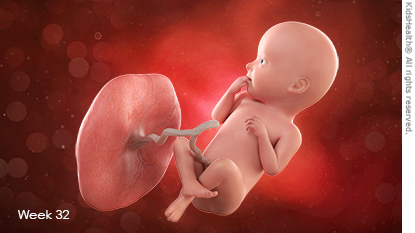- Home
- Humana Medicaid
- Kentucky Medicaid
- Medicaid extras
- Health and wellness
- Parents Home
- Para Padres
- A to Z Dictionary
- Allergy Center
- Asthma
- Cancer
- Diabetes
- Diseases & Conditions
- Doctors & Hospitals
- Emotions & Behavior
- First Aid & Safety
- Flu (Influenza)
- Food Allergies
- General Health
- Growth & Development
- Heart Health & Conditions
- Homework Help Center
- Infections
- Newborn Care
- Nutrition & Fitness
- Play & Learn
- Pregnancy Center
- Preventing Premature Birth
- Q&A
- School & Family Life
- Sports Medicine
- Teens Home
- Para Adolescentes
- Asthma
- Be Your Best Self
- Body & Skin Care
- Cancer
- Diabetes
- Diseases & Conditions
- Drugs & Alcohol
- Flu (Influenza)
- Homework Help
- Infections
- Managing Your Weight
- Medical Care 101
- Mental Health
- Nutrition & Fitness
- Q&A
- Safety & First Aid
- School, Jobs, & Friends
- Sexual Health
- Sports Medicine
- Stress & Coping
Pregnancy Calendar: Week 32
Your Baby's Development
The final touches are being placed on your baby masterpiece.  Eyelashes, eyebrows, and the hair on your baby's head are evident. The lanugo hair that has covered your baby since the beginning of the second trimester is falling off, although some may remain on the shoulders and back at birth.
Eyelashes, eyebrows, and the hair on your baby's head are evident. The lanugo hair that has covered your baby since the beginning of the second trimester is falling off, although some may remain on the shoulders and back at birth.
At about 4 pounds (1,800 grams) and 11.4 inches (29 cm) from crown to rump, your baby would have an excellent chance of survival outside the womb if you delivered now.

Your Body
 During your prenatal visits, your health care provider will monitor your blood pressure, urine, and any swelling that may develop. But symptoms such as sudden weight gain, swelling in the hands or face, headaches, or changes in vision can be signs of preeclampsia. This condition causes high blood pressure and protein in the urine. Tell your health care provider right away if you have any of these symptoms.
During your prenatal visits, your health care provider will monitor your blood pressure, urine, and any swelling that may develop. But symptoms such as sudden weight gain, swelling in the hands or face, headaches, or changes in vision can be signs of preeclampsia. This condition causes high blood pressure and protein in the urine. Tell your health care provider right away if you have any of these symptoms.

© 1995- The Nemours Foundation. KidsHealth® is a registered trademark of The Nemours Foundation. All rights reserved.
Images sourced by The Nemours Foundation and Getty Images.